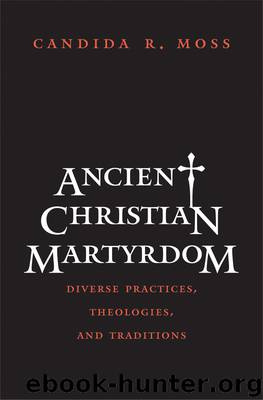Ancient Christian Martyrdom by Candida R. Moss

Author:Candida R. Moss
Language: eng
Format: epub
Publisher: Yale University Press
Published: 2017-01-24T05:00:00+00:00
6
Alexandria: Clement and the True Martyr
For many ancient Christians, as for ancient Romans, Greeks, and Jews, dying a noble death was something to be embraced, valued, and perhaps even coveted. Yet despite the general high regard in which martyrs and martyrdom were held, some Christians were more interested in avoiding untimely death. Amid the spectacular din of the confessions of martyrs, the roar of the crowd, and the clamor of the courtroom, there were quieter, hesitant voices. Many martyr acts present martyrdom as a sharp choice that cut to the core of Christian identity—life or death, salvation or damnation, Christ or apostasy—but things may not have been so cut and dried for everyone. In the history of ideas, distinctions have been drawn between those who were enthusiastically pro-martyrdom, those who were pro-martyrdom, and those who were anti-martyrdom. These categories are, in turn, aligned with doctrinal positions: the philosophical group known as the Gnostics are cast as anti-martyrdom; Montanists and Donatists as enthusiastic practitioners of voluntary martyrdom; and the orthodox as occupying a neutral, moderate, pro-martyrdom stand. The rhetorical formation of the true martyr in antiquity was decidedly more complicated and sophisticated than these categories lead us to believe. Not only are the designations “Montanist,” “Gnostic,” and “orthodox” homogenizing caricatures, but, as we will see, the categorization of these positions as for and against martyrdom fails to reflect the texture of ancient discourse. The construction of the true martyr was as contested among early Christians as it is among modern scholars. Through a lens focused on Alexandria and on Clement of Alexandria’s treatment of martyrdom, we examine the ways in which martyrdom was produced discursively in early Christianity. The approach is not comprehensive, but rather is strategically concentrated on two objectives: first, to deconstruct the idea that attitudes toward martyrdom can be delineated on doctrinal grounds, and second, to reveal how ancient authors constructed true martyrdom as distinct from other forms of martyrdom such as voluntary martyrdom or anti-martyrdom.
Clement of Alexandria
The delineation of different forms of martyrdom and the rhetorical formation of the true martyr began in earnest with the second-century Christian philosopher Clement of Alexandria (d. ca. 215 CE). Alexandria, the home of Clement until his flight from persecution in the early years of the third century, was a bustling city second in size only to Rome. It had an especially storied history of persecution, as religious unrest and friction had plagued the city since the Ptolemaic period. In the first century, Alexandria had been the setting of a series of religious riots between Jews and Greeks, and an uprising in 115–117 CE had led the emperor Hadrian to deport the majority of the Jewish population. It was not unusual, then, to find religious groups in conflict in Alexandria.
Unlike the other authors examined in this book, Clement of Alexandria wrote neither martyr acts nor apologies. His ideas about martyrdom appear mostly as part of larger discussions of virtue in his voluminous work the Miscellanies. If there were early accounts of
Download
This site does not store any files on its server. We only index and link to content provided by other sites. Please contact the content providers to delete copyright contents if any and email us, we'll remove relevant links or contents immediately.
The Gnostic Gospels by Pagels Elaine(2531)
Jesus by Paul Johnson(2362)
Devil, The by Almond Philip C(2332)
The Nativity by Geza Vermes(2230)
The Psychedelic Gospels: The Secret History of Hallucinogens in Christianity by Jerry B. Brown(2157)
Forensics by Val McDermid(2094)
Going Clear: Scientology, Hollywood, and the Prison of Belief by Lawrence Wright(1985)
Going Clear by Lawrence Wright(1968)
Barking to the Choir by Gregory Boyle(1822)
Old Testament History by John H. Sailhamer(1815)
Augustine: Conversions to Confessions by Robin Lane Fox(1773)
The Early Centuries - Byzantium 01 by John Julius Norwich(1745)
A History of the Franks by Gregory of Tours(1729)
A Prophet with Honor by William C. Martin(1725)
Dark Mysteries of the Vatican by H. Paul Jeffers(1723)
The Bible Doesn't Say That by Dr. Joel M. Hoffman(1681)
by Christianity & Islam(1634)
The First Crusade by Thomas Asbridge(1610)
The Amish by Steven M. Nolt(1574)
